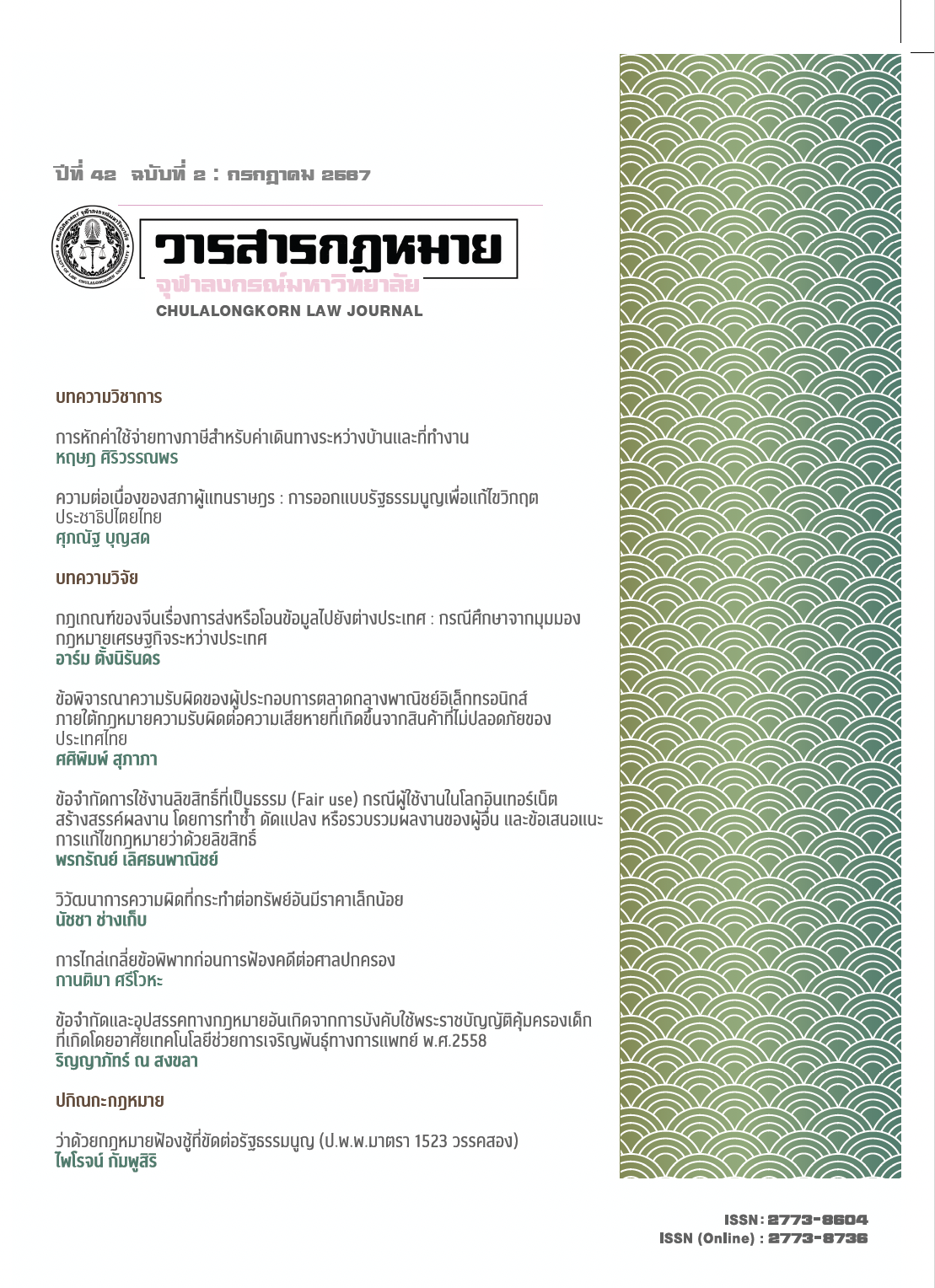วิวัฒนาการความผิดที่กระทำต่อทรัพย์อันมีราคาเล็กน้อย
Main Article Content
บทคัดย่อ
การกระทำความผิดต่อทรัพย์ เป็นการกระทำความผิดที่พบมากในสังคมไทย แต่มีลักษณะการกระทำความผิดและสร้างความเสียหายที่เกิดกับสังคมแตกต่างกันออกไป โดยเฉพาะการกระทำความผิดต่อทรัพย์อันมีราคาเล็กน้อยกับการกระทำความผิดต่อทรัพย์ที่มีมูลค่าหรือราคาจำนวนมากที่สร้างความเสียหายในระดับร้ายแรง ซึ่งผู้กระทำความผิดมักมีมูลเหตุจูงใจหรือวัตถุประสงค์ที่มุ่งหมายกระทำแตกต่างกัน แต่กลับพบว่าตามประมวลกฎหมายอาญาของไทย มิได้มีการแบ่งแยกความผิดต่อทรัพย์อันมีราคาเล็กน้อยไว้โดยเฉพาะ ทำให้ผู้กระทำความผิดต่อทรัพย์อันมีราคาเล็กน้อย ซึ่งถือเป็นความผิดอาญาที่ไม่ร้ายแรง ต้องระวางโทษเช่นเดียวกับผู้ที่กระทำความผิดต่อทรัพย์ในลักษณะอื่น ซึ่งไม่เป็นไปตามหลักความได้สัดส่วนกับความผิด
ผลจากการศึกษาวิวัฒนาการความผิดต่อทรัพย์อันมีราคาเล็กน้อยตั้งแต่อดีตถึงปัจจุบันของทั้งกฎหมายไทย กฎหมายของจักรวรรดิโรมัน กฎหมายของประเทศอินเดีย อังกฤษ และจีน พบว่า แนวคิดเกี่ยวกับการกระทำความผิดต่อทรัพย์อันมีราคาเล็กน้อยปรากฏตั้งแต่ยุคก่อนคริสตกาล โดยเป็นการกระทำต่อทรัพย์ของบุคคลธรรมดา เช่น พืชหรือสัตว์ที่ใช้ในการบริโภค โดยผู้กระทำความผิดจะได้รับเพียงโทษปรับหรือชดใช้ค่าเสียหายเท่านั้น ต่อมาเมื่อสังคมแต่ละประเทศเจริญพัฒนามากขึ้น แนวคิดเกี่ยวกับการกระทำต่อทรัพย์อันมีราคาเล็กน้อย ได้เปลี่ยนแปลงไปจากปัจจัยทางด้านเศรษฐกิจ การบังคับใช้กฎหมาย หรือการเลือกดำเนินนโยบายทางอาญา เป็นต้น ซึ่งประเทศอังกฤษ อินเดีย และจีน ยังคงกำหนดฐานความผิดต่อทรัพย์อันมีราคาเล็กน้อยไว้เป็นบทบัญญัติเฉพาะตั้งแต่อดีตถึงปัจจุบัน
Article Details

อนุญาตภายใต้เงื่อนไข Creative Commons Attribution-NonCommercial-NoDerivatives 4.0 International License.
ลิขสิทธิ์และเนื้อหาในเว็บไซต์ของวารสารกฎหมาย (รวมถึง โดยไม่จำกัดเฉพาะ เนื้อหา รหัสคอมพิวเตอร์ งานศิลป์ ภาพถ่าย รูปภาพ ดนตรีกรรม โสตทัศนวัสดุ) เป็นกรรมสิทธิ์ของวารสารกฎหมาย และผู้ได้รับการโอนสิทธิทุกราย
1. วารสารกฎหมาย ให้อนุญาตให้คุณใช้สิทธิอันไม่เฉพาะเจาะจงที่สามารถถูกถอนเมื่อใดก็ได้ โดยไม่มีค่าใช้จ่าย ในการ
- เยี่ยมชมเว็บไซต์และเอกสารในเว็บไซต์นี้ จากคอมพิวเตอร์หรือเครื่องมือสื่อสารผ่านเว็บบราวเซอร์
- คัดลอกและจัดเก็บเว็บไซต์และเอกสารในเว็บไซต์นี้บนลงคอมพิวเตอร์ของคุณผ่านระบบความจำ cache
- สั่งพิมพ์เอกสารจากเว็บไซต์นี้สำหรับการใช้ส่วนตัวของคุณ
- ผลงานที่ได้รับการตีพิมพ์โดยวารสารกฎหมาย จุฬาลงกรณ์มหาวิทยาลัย ถูกคุ้มครองภายใต้ Creative Commons Attribution 4.0 International License ซึ่งอนุญาตให้ทุกคนสามารถคัดลอก แจกจ่าย ดัดแปลง ส่งต่อ ผลงานได้ ก็ต่อเมื่อผลงานและแหล่งข้อมูลได้รับการอ้างอิงอย่างเหมาะสม
2. วารสารกฎหมาย จุฬาลงกรณ์มหาวิทยาลัย สงวนสิทธิ์ไม่อนุญาตให้คุณใช้สิทธิอื่นใดที่เกี่ยวข้องกับเว็บไซต์และเอกสารบนเว็บไซต์นี้ เช่น การคัดลอก ดัดแปลง เปลี่ยนแปลง ส่งต่อ ตีพิมพ์ แจกจ่าย เผยแพร่ จัดแสดงในที่สาธารณะ ไม่ว่าจะในรูปแบบใดก็ตาม ซึ่งเว็บไซต์หรือเอกสารบนเว็บไซต์ โดยไม่อ้างอิงถึงแหล่งข้อมูลหรือโดยไม่ได้รับอนุญาตเป็นลายลักษณ์อักษรจากวารสารกฎหมาย จุฬาลงกรณ์มหาวิทยาลัย
3. คุณอาจขออนุญาตที่จะใช้เอกสารอันมีลิขสิทธิ์บนเว็บไซต์นี้โดยการเขียนอีเมลล์มายัง journal@law.chula.ac.th
4. วารสารกฎหมาย จุฬาลงกรณ์มหาวิทยาลัย เข้มงวดกับการคุ้มครองลิขสิทธิ์อย่างมาก หากวารสารกฎหมาย จุฬาลงกรณ์มหาวิทยาลัยพบว่าคุณได้ใช้เอกสารอันมีลิขสิทธิ์บนเว็บไซต์นี้โดยไม่ถูกต้องตามการอนุญาตให้ใช้สิทธิ ดังที่กล่าวไปข้างต้น วารสารกฎหมาย จุฬาลงกรณ์มหาวิทยาลัยอาจดำเนินคดีตามกฎหมายต่อคุณได้ เพื่อเรียกร้องค่าเสียหายที่เป็นตัวเงินและคำขอชั่วคราวให้คุณหยุดการใช้เอกสารดังกล่าว ทั้งนี้ คุณอาจถูกสั่งให้ชดใช้ค่าใช้จ่ายใดๆ ที่เกี่ยวข้องกับการดำเนินการตามกฎหมายนี้
หากคุณพบเห็นการใช้เอกสารอันมีลิขสิทธิ์ของวารสารกฎหมาย จุฬาลงกรณ์มหาวิทยาลัย ที่ขัดหรืออาจขัดต่อการอนุญาตให้ใช้สิทธิดังที่ได้กล่าวไปข้างต้น โดยเชื่อว่าได้ละเมิดลิขสิทธิ์ของคุณหรือของผู้อื่น สามารถร้องเรียนมาได้ที่ journal@law.chula.ac.th
เอกสารอ้างอิง
“รายงานการประชุมอนุกรรมการตรวจพิจารณาแก้ไขประมวลกฎหมายาอาญา พ.ศ. 2485 ครั้งที่ 372,125/2485,” (พระนคร สำนักงานคณะกรรมการกฤษฎีกา, 2485)
“รายงานการประชุมอนุกรรมการตรวจพิจารณาแก้ไขประมวลกฎหมายาอาญา พ.ศ. 2485 ครั้งที่ 376,227/2485,” (พระนคร สำนักงานคณะกรรมการกฤษฎีกา, 2485)
Andrew von Hirsch, Censure And Sanctions, (New York: Oxford University Press, 2555)
CHIANGMAI NEWS, “สลดพิษโควิด หนุ่มตกงานไม่มีเงิน ต้องแอบขโมยมาม่าร้านสะดวกซื้อ ประทังชีวิตกับพ่อ แต่ภาพวงจรปิด จับเหตุการณ์ตอนก่อเหตุได้ สุดท้ายต้องถูกจับกุมดำเนินคดี” [ออนไลน์] แหล่งที่มา : https://www.chiangmainews.co.th/page/archives/1670056 [30 เมษายน 2565]
D.C.L. J.B. Moyle, The Institutes of Justinian, 5th (New Jersey: USA, 2002)
David Skuy, “Macaulay and the Indian Penal Code of 1862: The Myth of the Inherent Superiority and Modernity of the English Legal System Compared to India’s Legal System in the Nineteenth Century”, in Modern Asian Studies, 32, 3 (1998): 518-546.
Edward P.Cheyney, Modern English reform, (USA: University of Pennsylvania press, 1962)
Henry Summerson, “Hanging Matters: Petty Theft, Sentence of Death, and a Lost Statute of Edward I”, in Law and History Review, 40, 1 (2022): 149-164.
Jill Harries, Law and Crime in the Roman World, (New York: Cambridge University Press, 2007)
Lisi Oliver, The Beginnings of English Law, (Canada: University of Toronto Press Incorporated, 2002)
Madhusudan Bandyopadhyay. A critical study of crime and punishment under the Sultans of Delhi 1206 to 1526. (Doctoral dissertation, Arts, University of Calcutta, 1976)
OBELISK ART HISTORY, “The Laws of Manu Chapter 8,” [online] Available from : https://www.arthistoryproject.com/timeline/the-ancient-world/classical-india/the-laws-of-manu/chapter-8/ [6 June 2022]
Rafael Domingo, Roman Law an introduction, (London and New York: Rotuledge, 2018)
Section 176 of The Anti-Social Behaviour, Crime and Policing Act 2014
Section 257 – 265 of The Qing Code.
Section 264 of Criminal Law of The People’s Republic Of China
Section 269 – 271 of The Qing Code.
Section 4 (3) of The Theft Act 1968
Section 426 of India Criminal Code 1860
Section 427 of India Criminal Code 1860
Section 428 of India Criminal Code 1860
Section 7 of The Theft Act 1968
Shizhou Wang, “On Development of Criminal Law in the People's Republic of China”, in Law and Politics in Africa, Asia and Latin America, 43, 3 (2010): 301.
The Tang Legal Code, “Law on theft and Robbery,” [online] Available from : https://web.colby.edu/eas150/files/2017/11/tang-legal-code.pdf [13 June 2022]
Thomas Yeon, “An Examination of the Practicability of Antony Duff and John Gardner’s Legal Moralism as a Basis of Criminalisation in Cotemporary English Criminal Law”, in LSE Law Review, 5 (2020): 157-159.
Tim Mulgan, Understanding Utilitarianism, (Stocksfield U.K.: Routledge, 2007)
Wang Chenguang and Zhang Xianchu, Introduction to chinese law, (China: Sweet & Maxwell Asia, 1997)
William C. Jones, “The Criminal Law of the People's Republic of China”, in Review of Socialist Law, 4 (1980): 407.
Xiaoqun Xu, Heaven has eyes : a history of Chinese law, (USA: Sheridan Books, Inc, 2020)
กฎหมายตราสามดวง พระอัยการลักขณโจรบทที่ 121
กรมศิลปากร, จารึกสมัยสุโขทัย, (กรุงเทพมหานคร: กองวรรณคดีและประวัติศาสตร์ กรมศิลปากร, 2526)
กรุณา-เรืองอุไร กุศลาสัย, อินเดียอนุทวีปที่น่าทึ่ง, พิมพ์ครั้งที่ 4 (กรุงเทพมหานคร: ศยาม, 2544)
กำธร กำประเสริฐ และสุเมธ จานประดับ, ประวัติศาสตร์กฎหมายไทยและระบบกฎหมายหลัก, พิมพ์ครั้งที่ 11 (กรุงเทพมหานคร: มหาวิทยาลัยรามคำแหง, 2563)
ข่าวสดออนไลน์, “สาวร่ำไห้ ลูกหิวไม่มีเงินซื้อ ก่อเหตุขโมยขนมปัง เผยไม่ได้ตั้งใจทำร้ายพนง.” [ออนไลน์] แหล่งที่มา : https://www.khaosod.co.th/around-thailand/news_6834824. [30 เมษายน 2565]
คณพล จันทน์หอม, รากฐานกฎหมายอาญา, พิมพ์ครั้งที่ 2 (กรุงเทพมหานคร: วิญญูชน, 2561)
คณะกรรมการศึกษาและพัฒนาความรู้ประวัติศาสตร์ไทย, ความรู้ในประวัติศาสตร์ไทย เล่ม 1 ฉบับราชบัณฑิตยสถาน, (กรุงเทพมหานคร: ราชบัณฑิตยสถาน, 2554)
ชาญวิทย์ เกษตรศิริ, ประวัติการเมืองไทย, (กรุงเทพมหานคร: สำนักพิมพ์ดอกหญ้า, 2538)
ดานุภา ไชยพรธรรม, จากรุ่งเรืองสู่ล่มสลายของจักรวรรดิโรมัน, (กรุงเทพมหานคร: บริษัท ยูโรปา เพรส จำกัด, 2560)
ปฏิญญาสากลว่าด้วยสิทธิมนุษยชน ข้อ 17
ปานชนก โตโอฬารไชย. การศึกษาเปรียบเทียบสถาบันสังคมของสหภาพโซเวียต และสาธารณรัฐประชาชนจีนในช่วงการปกครอง ของโจเซฟ สตาลิน และเหมา เจ๋อตง. วิทยานิพนธ์ปริญญามหาบัณฑิต สาขาวิชารัสเซียศึกษา คณะศิลปศาสตร์ มหาวิทยาลัยธรรมศาสตร์, 2560
พรชัย ขันตี, ทฤษฎีอาชญาวิทยา : หลักการ งานวิจัย และนโยบายประยุกต์, (กรุงเทพมหานคร: ห้างหุ้นส่วนจำกัดสุเนตรฟิล์ม, 2553)
พระอัยการลักขณโจร บทที่ 116
พระอัยการลักขณโจร บทที่ 117-124
พระอัยการลักขณโจร บทที่ 120-122
พระอัยการลักขณโจร บทที่ 47, 48 และ 52
พระอัยการลักขณโจร บทที่ 49 และ 50
พระอัยการลักขณโจร บทที่ 53, 54, 57 และ 70
พระอัยการลักขณโจร บทที่ 93
พระอัยการลักษณะอาญาหลวง บทที่ 2 และพระอัยการลักขณโจร บทที่ 60, 67 และ 74
เพ็ชรี สุมิตร, อารยธรรมตะวันออก, (กรุงเทพมหานคร: โรงพิมพ์มหาวิทยาลัยธรรมศาสตร์, 2509)
มาตรา 292 กฎหมายลักษณะอาญา ร.ศ. 127
มาตรา 293 กฎหมายลักษณะอาญา ร.ศ. 127
มาตรา 335 วรรคท้าย ประมวลกฎหมายอาญา
มาตรา 37 รัฐธรรมนูญแห่งราชอาณาจักรไทย พุทธศักราช 2560
วิทยาภาษาจีนปักกิ่ง, มหาวิทยาลัยครูหนานจิง และมหาวิทยาลัยครูอันฮุย, ความรู้ทั่วไปเกี่ยวกับประวัติศาสตร์ประเทศจีน, (กรุงเทพมหานคร: สุขภาพใจ, 2550)
ศนันกรณ์ โสตถิพันธุ์, ความรู้เบื้องต้นเกี่ยวกับกฎหมายเอกชนโรมัน, (กรุงเทพมหานคร: สำนักพิมพ์วิญญูชน, 2559)
ศฤงคาร พันธุพงศ์, ประวัติศาสตร์ยุโรป 2, พิมพ์ครั้งที่ 2 (กรุงเทพมหานคร: สำนักพิมพ์มหาวิทยาลัยรามคำแหง, 2540)
ศิลปวัฒนธรรม, “ชีวิตคนไทยช่วงสงครามโลกครั้งที่ 2 ใช้ถ่านหุงข้าวให้รถวิ่งแทนน้ำมัน-โจรอาละวาดหนัก” [ออนไลน์] แหล่งที่มา : https://www.silpa-mag.com/history/article_11854. [17 กันยายน 2565]
สำนักงานตำรวจแห่งชาติ, รายงานประจำปีงบประมาณ พ.ศ. 2563 เรื่อง สถิติคดีอาญาทั่วราชอาณาจักร ประจำปีงบประมาณ พ.ศ. 2563, (กรุงเทพมหานคร: โรงพิมพ์ตำรวจ, 2563)
สุนัย มโนมัยอุดม, ระบบกฎหมายอังกฤษ, พิมพ์ครั้งที่ 6 (กรุงเทพมหานคร: โรงพิมพ์เดือนตุลา, 2559)
สุภัชลี เทพหัสดิน ณ อยุธยา, “กฎหมายอาญาเฟ้อ”, วารสารสังคมศาสตร์และมนุษยศาสตร์, 44, 2 (2561): 9-10.
แสวง บุญเฉลิมวิภาส, ประวัติศาสตร์กฎหมายไทย, พิมพ์ครั้งที่ 13 (กรุงเทพมหานคร: วิญญูชน, 2557)
หยุด แสงอุทัย, คำอธิบายกฎหมายลักษณะอาญา ร.ศ. 127, พิมพ์ครั้งที่ 7 (กรุงเทพมหานคร: วิญญูชน, 2561)
หลวงสุทธิวาทนฤพุฒิ, คำบรรยายประวัติศาสตร์กฎหมาย ชั้นปริญญาโท, (กรุงเทพมหานคร: โรงพิมพ์มหาวิทยาลัยธรรมศาสตร์, 2516)
อภิรัตน์ เพ็ชรศิริ, ทฤษฎีอาญา ทฤษฎีโทษ และกระบวนการขั้นพื้นฐาน, พิมพ์ครั้งที่ 4 (กรุงเทพมหานคร: วิญญูชน, 2562)
อัจฉรียา ชูตินันทน์, อาชญาวิทยาและทัณฑวิทยา, พิมพ์ครั้งที่ 4 (กรุงเทพมหานคร: วิญญูชน, 2563)
อัณณพ ชูบำรุง, ทฤษฎีอาชญาวิทยา, (กรุงเทพมหานคร: สำนักพิมพ์โอเดียนสโตร์, 2527)
อาร์ม ตั้งนิรันดร, ความรู้เบื้องต้นเกี่ยวกับระบบกฎหมายจีน, (กรุงเทพมหานคร: วิญญูชน, 2557)
เอช เอกูต์, คำสอนขั้นปริญญาตรี พุทธศักราช 2477 กฎหมายอาชญา, (กรุงเทพมหานคร: มหาวิทยาลัยวิชาธรรมศาสตร์และการเมือง, 2477)


